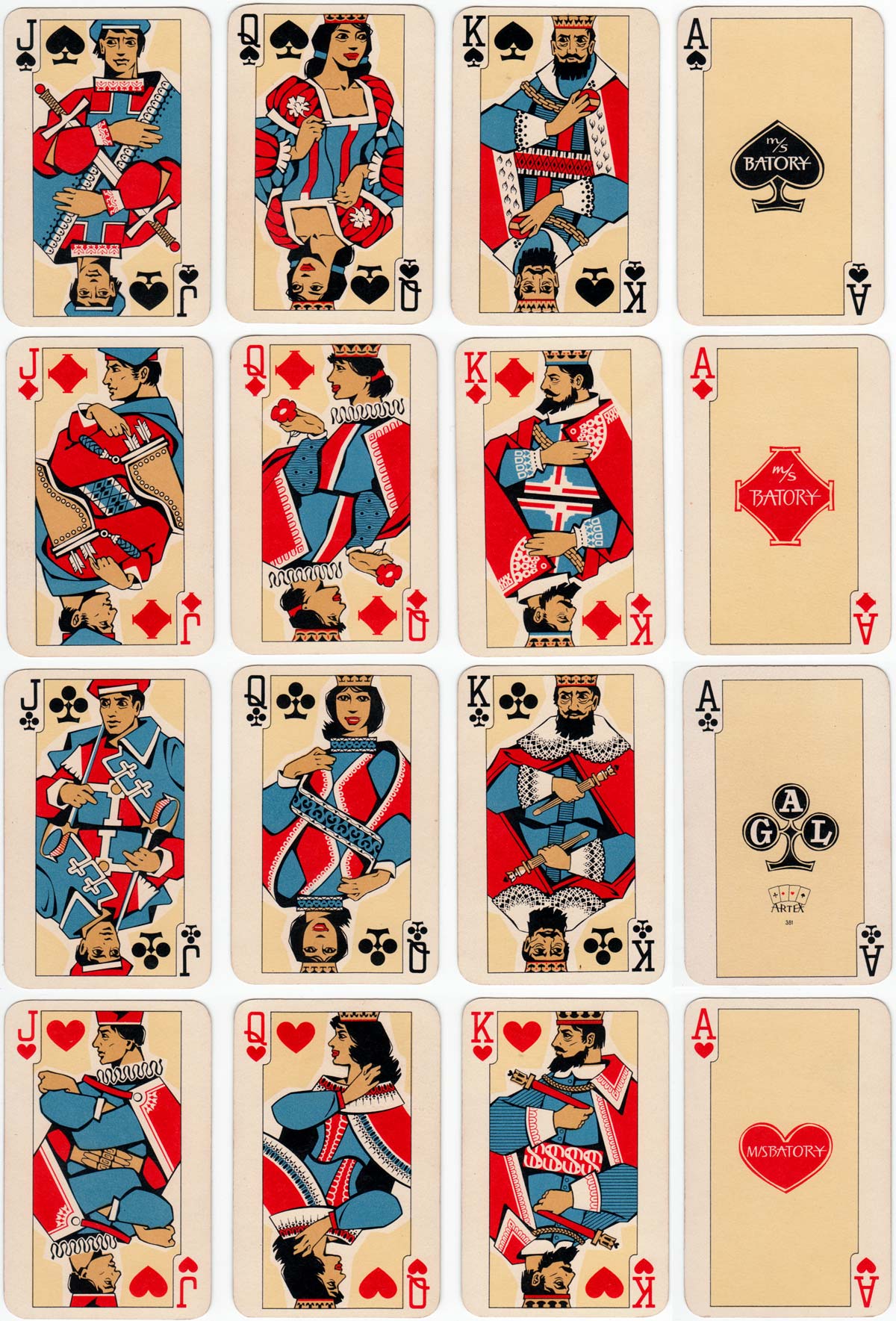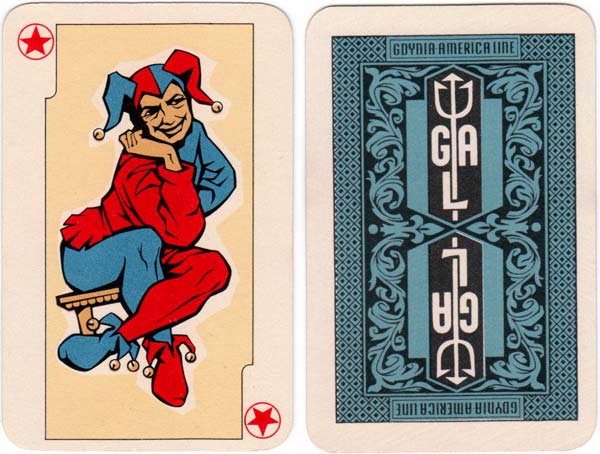Gdynia-America Line
Non-standard playing cards produced by Artex (Budapest) for the Gdynia-America Line, Poland, c.1958.

Non-standard playing cards produced by Artex (Budapest) for the Gdynia-America Line, Poland, c.1958. The initials G.A.L. appear on the Ace of Clubs and the reverse.


Above: Non-standard playing cards produced by Artex (Budapest) for the Gdynia-America Line, Poland, 1958. English indices. The initials G.A.L. appear on the Ace of Clubs and the reverse. The motorship "Batory" was one of two diesel-powered ships completed in 1936 for the North Atlantic run of the Gdynia-America Line. Almost identical packs were produced for Polish Ocean Lines.

“Artex” was the export brand name “ARt EXport” used by Ofszet- és Játékkártyagyár és Nyomda (Playing-Card Factory and Printing House) after Piatnik pulled out of their Budapest branch. It exported playing cards and many other art products, paintings, etchings, ceramics, etc.

By Rex Pitts (1940-2021)
Member since January 30, 2009
Rex's main interest was in card games, because, he said, they were cheap and easy to get hold of in his early days of collecting. He is well known for his extensive knowledge of Pepys games and his book is on the bookshelves of many.
His other interest was non-standard playing cards. He also had collections of sheet music, music CDs, models of London buses, London Transport timetables and maps and other objects that intrigued him.
Rex had a chequered career at school. He was expelled twice, on one occasion for smoking! Despite this he trained as a radio engineer and worked for the BBC in the World Service.
Later he moved into sales and worked for a firm that made all kinds of packaging, a job he enjoyed until his retirement. He became an expert on boxes and would always investigate those that held his cards. He could always recognize a box made for Pepys, which were the same as those of Alf Cooke’s Universal Playing Card Company, who printed the card games. This interest changed into an ability to make and mend boxes, which he did with great dexterity. He loved this kind of handicraft work.
His dexterity of hand and eye soon led to his making card games of his own design. He spent hours and hours carefully cutting them out and colouring them by hand.
Related Articles

IG Chemie Papier Keramik
Promotional pack designed by Karl-Heinz Schroers for a German trade union with comical bears on the ...

Tarock Cards by NIL Spielkartenfabrik
A deck of tarock cards from the eastern end of the ending Austro-Hungarian Empire.

More Menthol Filter Cigarettes
Elongated cards with designs by Wong Yui Man advertising More cigarettes.

Jockey Club de Buenos Aires
Spanish-suited pack by Chas Goodall & Son Ltd for the Jockey Club, Buenos Aires.

Trappola cards from Poland
Trappola cards published in Warsaw by J G Du Port during the 18th century.

Leadmill playing cards
Promotional pack for an arts centre in Sheffield with designs by Martin F. Bedford.

Warka playing cards
Advertising pack for the Polish brewery Warka, featuring footballers, coaches and supporters.

Simpson (Piccadilly) playing cards
Innovative advertising pack for Simpsons of Piccadilly designed by André François.

Hamlet Cigars
Advertising deck for “Hamlet mild cigars”, a Benson & Hedges product.

Smith-Corona Marchant
Simplified yet colourful court card designs by Avoine for Smith-Corona Marchant.

Austria Ski Team playing cards
Photos of members of the Austrian skiing team replace the normal courts on two different packs.

Unimog UX 100
Cartoons promoting the Unimog UX 100, a small truck produced by Mercedes-Benz.

Star Trek® – The Original Series
Promotional pack for CIC Video with characters and starships from the original series of Star Trek. ...

Medizin Skat
Promotional pack for a hospital group in the Saarland, with non-standard suits and courts designed b...

Naipes Kukuxumusu
A 52-card Spanish-suited advertising pack for a clothing company in Pamplona.

Introduction to Collecting Themes
Playing cards can be broadly categorised into standard and non-standard designs, with collectors app...
Most Popular
Our top articles from the past 28 days

